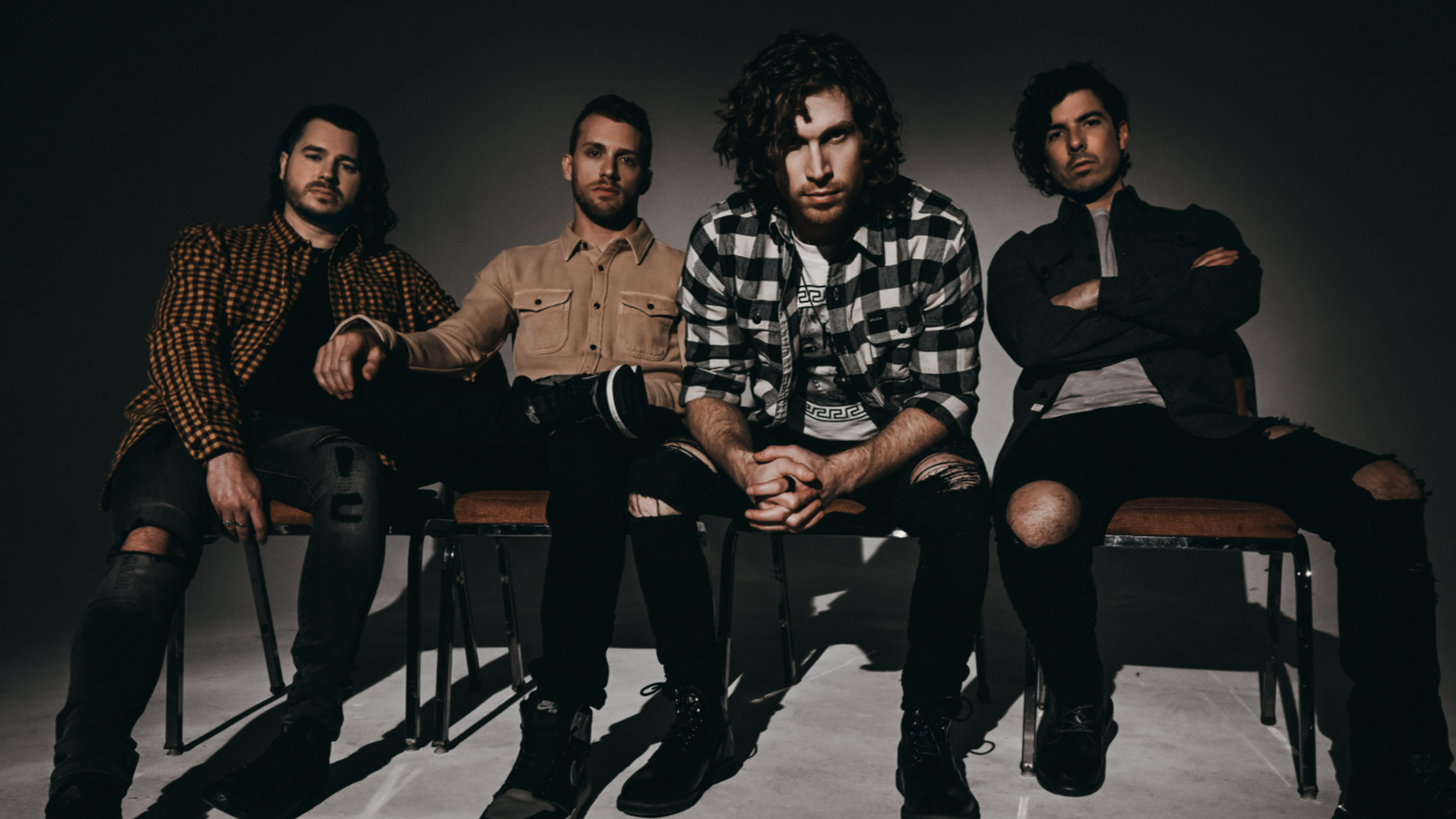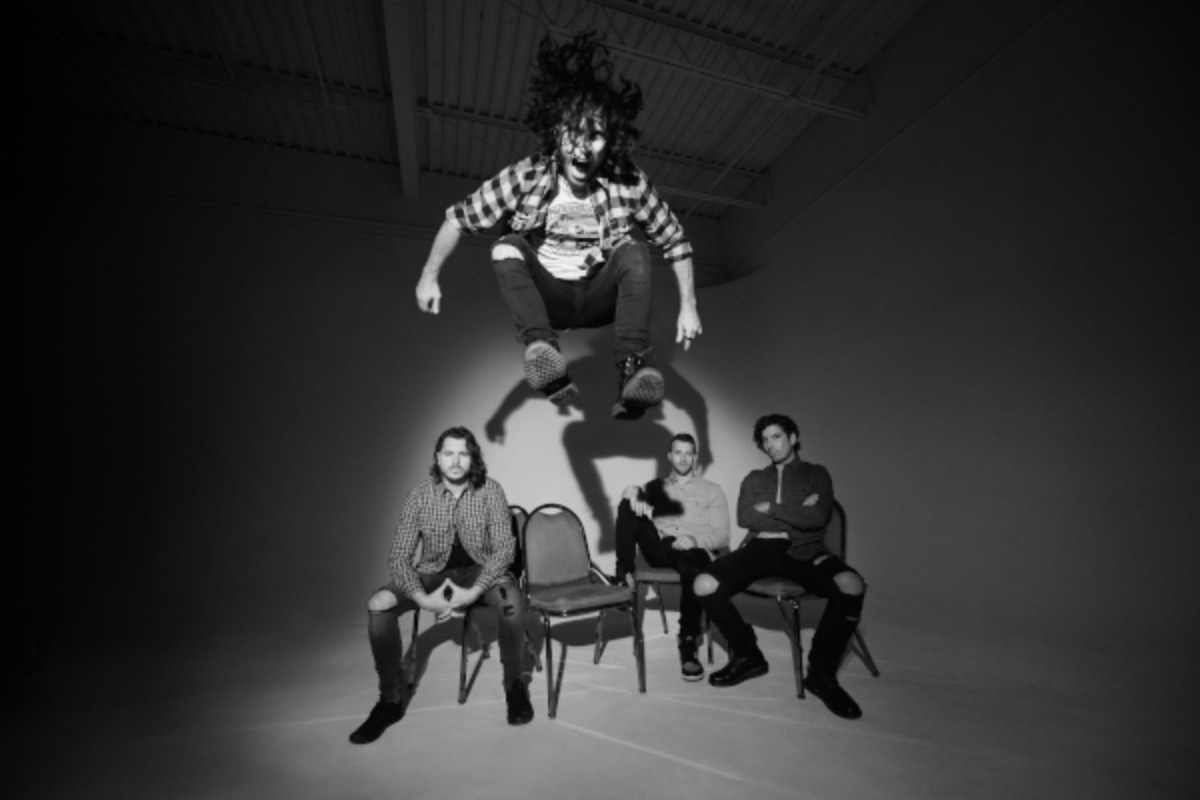Nothing More on the personal challenges that fed new album Spirits, and how 2014's Jenny moved the band into a position of mental health advocacy
Written for vocalist Jonny Hawkins' sister, who suffers with bipolar disorder, Jenny saw considerable mainstream success, and even spawned mental health movements. Here, guitarist Mark Vollelunga and bassist Daniel Oliver reflect on how music can be "more than just frequencies"

This article is part of GuitarWorld.com's series of interviews and features with artists addressing and raising awareness around themes of mental health, particularly as they relate to musicians.
On October 14, Nothing More – vocalist Jonny Hawkins, guitarist Mark Vollelunga, bassist Daniel Oliver, and drummer Ben Anderson – released their new album, Spirits.
Featuring 13 songs, Spirits is a musical exploration into self-awareness, mindfulness, and philosophy, much of it stemming from the members’ personal challenges during pandemic-mandated lockdowns, social distancing, and cancelled tours.
“It was a very difficult and frustrating time for everybody, and definitely for us, because we're very used to doing everything together,” says Vollelunga. “We had to hone our skills and file-share everything. We learned a lot and we grew from it, but it's not a process that we'll do again.”
Spirits follows the band’s three previous releases, which have earned them three Grammy nominations and a half-dozen Top 10 singles.
Still, when fans think of Nothing More, they often go back to 2014’s Jenny, a deeply personal track that Hawkins wrote about his sister’s battle with bipolar depression.
Its unexpected success turned the band into mental health advocates – a position they strive to fulfill, as Vollelunga and Oliver discuss in this interview.
Get The Pick Newsletter
All the latest guitar news, interviews, lessons, reviews, deals and more, direct to your inbox!
Let’s start with the learning and growing on Spirits.
Vollelunga: “We're excited about this album. It's a bit more experimental, and we like to think it has a more mature, tasteful touch. There are several 8-string guitar songs, which I had never played before. There's some electric ukulele. There’s a span of sounds and genres on it. We recorded with a Fractal Axe-Fx III [amp modeler], which is what we use live.
“Dan and I work very well and very quickly together. We set up shop in my garage for most of the guitars and bass, and a lot of background vocals were recorded there, too. Jonny has his studio in Baton Rouge, and Ben is in Phoenix. I think we all saw each other twice in 2020, and in 2021 I don’t think we were in the same room together at all.”
Oliver: “I come from an old-school, fingerstyle kind of playing, but on this album I took on more technical, faster, rhythmic right hand stuff. I also used an electric upright bass on the song Déjà Vu.”
The reason I love songwriting and performing is being able to connect with people
Mark Vollelunga
Which guitars and basses did you use?
Vollelunga: “I've been with Aristides, a small Dutch company, since 2014. Almost everything you hear on the album is Aristides, with a few Fender Strats for accessory tones. And Ernie Ball strings.
“Aristides guitars are amazing. They’re carbon fiber, and it’s pristine gear through and through. They take extremely good care of me anytime I need something, and I'm very thankful.”
Oliver: “I primarily used a Music Man Bongo five-string, double humbucker bass. On a few songs I played a Mexican P-Bass with flatwounds to give it a dark tone. As Mark said, we came into our own with this album as far as creating soundscapes using the tools we had right there.”
Jenny is a defining song for Nothing More. How did it change things in terms of wanting to move the band into a position of mental health advocacy?
Vollelunga: “I remember writing the song together. Jonny was going through this situation with his family and his sister, and we were trying to be good storytellers and capture this moment, this pain, this kind of tough love that was going on for him.
“People fell in love with the song, related to it, and then came the ‘I know Jenny’ movement, because everyone has a person that’s like Jenny to them. I didn't realize how big that song and that story and the advocacy for mental health could be and was going to be. It has been awesome.
“The reason I love songwriting and performing is being able to connect with people. Hearing their stories about how this song helped them through a really hard time means the world to me, because there are so many songs that have helped me through hard times and life and getting from here to there.”
I was so afraid to confront therapy because of the stigma, but after you take that first step in, you realize that everyone is broken and fucked up in some way, and we're all just trying to hold ourselves together
Daniel Oliver
Oliver: “I applaud Jonny for having the courage to write that song, especially seeing how impactful it has been and how important it's been to so many people. I had no idea that it would take off that way.
“It’s a great song, but then to see people’s connection with it and how many have come up to each one of us and said, ‘I was Jenny, and this song helped me slay my demons’ – we had no idea when we were writing it. It shows the power of music and community and expression. It's a cool thing to tap into.”
Over the years, Nothing More has partnered with a number of mental health organizations. Are you still involved with any particular group?
Vollelunga: “We saw Chad Moses [Director of Outreach] from To Write Love On Her Arms at the Blue Ridge Rock Fest in September. We did a livestream about their recent campaign, You Are Not A Burden.
“We love helping them with whatever they need, whenever they need it. We're big fans of theirs and really appreciate what they do – spreading hope and helping people find mental health resources.”
Prior to Jenny, was mental health of interest or concern to either of you?
Vollelunga: “I've definitely dealt with anxiety and depression. It wasn’t severe, although it's never anything to take lightly. During the pandemic, I really questioned my self-worth, because being in a band is like being on a team. It's like one part doesn't exist without the whole.
“So it was very strange being apart from each other for so long, feeling broken, and wondering if we would be able to put it all back together and do it again. Those were very hard times for me. I’m so grateful to be back on the road, playing music for people, hearing their stories, and sharing my stories. I feel blessed to do this.”
Oliver: “There is addiction on both sides of my family, and other things as well. I've sought counseling many times to change my outlook on a situation I'm going through that I can't seem to deal with on my own. So often it just takes talking to someone else to break you out of hell.
“That's definitely happened to me, for sure. I have also been to AA. It was a part of me moving away from alcohol, and I haven’t had a drink in over three years. It wasn’t about alcohol as much as about rebuilding my life.
“I was so afraid to confront therapy because of the stigma, but after you take that first step in, you realize that everyone is broken and fucked up in some way, and we're all just trying to hold ourselves together enough to get to the next day without people hating us or us hating ourselves.
“I have also done online therapy, which is such an advantage with us being on the road. It’s also great if someone doesn’t want to drive or go in person. You can just get on your computer and talk to a therapist.”

What part does music play in taking care of your mental health?
Oliver: “Music is magical. Listening to a certain song can totally change your day. It can create energy. It can create all sorts of powerful things, and I feel like that is the hope of change. From the aspect of being in a band, this is a brotherhood. We are best friends.
“As songwriters, we have a job where it's beneficial to talk about our feelings and the deepest, darkest stuff. Being able to vent that is so powerful. You don't feel alone.
“When you expose yourself and become vulnerable through your songs, it creates a space where others do that as well, and they're able to lift you up in the most powerful way.”
Music has always been my calling. It's always been so special to me. I feel something magical whenever I am able to create something that is beautiful to someone else and that helps them through something
Mark Vollelunga
Vollelunga: “That’s a great answer. Music is more than just frequencies. Like Dan's saying, it's a commitment for us, and that has been our story. It has been a brotherhood.
“Music has always been my calling. It's always been so special to me. I feel something magical whenever I am able to create something that is beautiful to someone else and that helps them through this or that. It’s like a job well done, if you will. That's so important to me.
“I am very grateful to feel of worth in that, like giving something back to people who are struggling. You have that power when you write music. It is a big responsibility, and I welcome that responsibility.”

Do you have some closing thoughts for readers who are experiencing mental health challenges?
Vollelunga: “Having gone through it, what helped me through was finding songs that are positive and uplifting. When you're in that vulnerable state, you can be sensitive to what you're listening to, so take heed of that. Also realize that you are not your stress and you are not your problem. Set yourself apart from that.
“I have learned not to live in the past or in the future. I live in the now, always. I can get through today. I can think about what I need to accomplish, what I need to do. I can appreciate what it means and feels like to be alive.
“That's a huge thing that has helped me when I am broken by anxiety or depression, or really struggling with my own self-worth. I stop and think about those things and know that I'm okay. I'm not a burden. I am of value, I am of worth, and that's big.
Oliver: “I really like what Mark. You aren't your stress and you aren't your problems. When you're in the heat of something intense, you're your own worst enemy. It takes admitting you have a problem to get over the problem, but it doesn't mean that you are the problem or that it is the whole of you.
“Self-judgment and fear of others judging me was a big deal for me. The moment you go down the road of help, that's when your problems are real, and that’s when you can fix them.
“Whether you're watching someone go through it or you're in the middle of it, the greatest thing you can ever have is patience. In my life, when it comes to making real life changes, it's almost a timing thing. You can try hard for a year or a year and a half and keep falling off your mission.
“But then something happens, and one day there's ground beneath your feet again. You feel like you have traction, and you feel yourself starting to climb the hill. Being at the bottom is a terrible place, for sure, but you go up from there.”
- Spirits is out now via Better Noise Music.
Mental health resources
Alison Richter is a seasoned journalist who interviews musicians, producers, engineers, and other industry professionals, and covers mental health issues for GuitarWorld.com. Writing credits include a wide range of publications, including GuitarWorld.com, MusicRadar.com, Bass Player, TNAG Connoisseur, Reverb, Music Industry News, Acoustic, Drummer, Guitar.com, Gearphoria, She Shreds, Guitar Girl, and Collectible Guitar.
“I knew the spirit of the Alice Cooper group was back – what we were making was very much an album that could’ve been in the '70s”: Original Alice Cooper lineup reunites after more than 50 years – and announces brand-new album
“The rest of the world didn't know that the world's greatest guitarist was playing a weekend gig at this place in Chelmsford”: The Aristocrats' Bryan Beller recalls the moment he met Guthrie Govan and formed a new kind of supergroup







![[from left] George Harrison with his Gretsch Country Gentleman, Norman Harris of Norman's Rare Guitars holds a gold-top Les Paul, John Fogerty with his legendary 1969 Rickenbacker](https://cdn.mos.cms.futurecdn.net/TuH3nuhn9etqjdn5sy4ntW.jpg)

